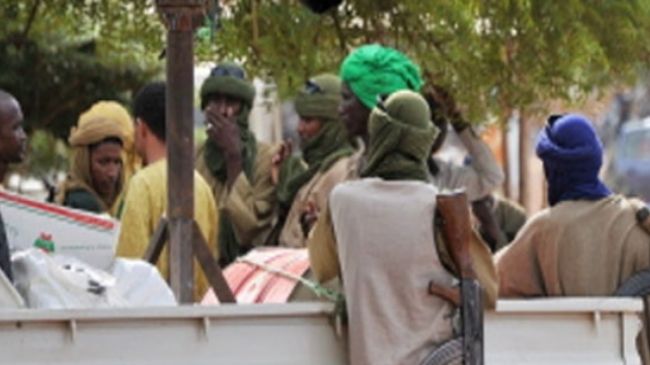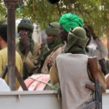
France and the Prospects for Military Intervention in Mali
Publication: Terrorism Monitor Volume: 10 Issue: 23
By:

France has watched warily as Mali has descended into chaos after the March 22 coup d’état overthrew Amadou Toumani Touré’s government and the Islamist rebellion took control of northern Mali. [1] France threw the weight of its diplomacy behind regional efforts to restore the constitutional order and territorial integrity of Mali. However, a military intervention is fraught with dangers and uncertainties for France, which, suspected by some of harboring ulterior motives, strives to ensure that its involvement does not result in the summary execution of seven hostages currently held by Islamist groups involved in the occupation of northern Mali.
Mali and France share strong historical and cultural bonds. Mali belonged to the French colonial empire and remains a francophone country. As a result of these ties, a large Malian diaspora lives in France though Mali remains only a minor commercial partner of France, ranking behind Côte d’Ivoire, Senegal, Benin and Niger. [2] Although the French government works to expand economic ties and remains a major aid donor, counter-terrorism issues have recently dominated the diplomatic agenda as al-Qaeda in the Islamic Maghreb (AQIM) has expanded its reach from southern Algeria into the broader Sahel region, including Mauritania, Mali and Niger.
France has long considered Mali to be the weakest link in the regional fight against AQIM. The reduced military presence in northern Mali as a result of peace accords in 1992 and 2006 enabled AQIM to use the area as a sanctuary and a logistical base to run the illicit activities that fund its operations (L’Express [Paris], May 14, 2010). Porous and poorly monitored borders allow AQIM fighters to come and go relatively freely. In response, the French Ministry of Foreign Affairs has developed several military cooperation programs designed to build the capacity of the Malian government in counter-terrorism and counter-trafficking, professionalize the Malian officer corps and provide training in peacekeeping. [3]
In addition, the rise of local Islamists in Ansar al-Din and their alliance with AQIM and the Movement for Unity and Jihad in West Africa (MUJWA) in northern Mali has only heightened Paris’ concerns, for the control of two-thirds of Mali by AQIM and like-minded Islamist groups is unacceptable. Officials in Paris foresee a risk that the region might turn into a “Sahelistan” where Salafi-Jihadist groups set up training camps and plot attacks on Western targets in Africa or Europe (Le Monde [Paris], August 4). French Minister of Defense Jean-Yves le Drian recently declared: “In Mali, it is our own security that is at stake, because if we don’t move, a terrorist entity will take shape which could hit this or another country, including France and including Europe” (Radio Télévision Luxembourg, November 11).
As a result, Paris has been lobbying members of the Economic Community of West African States (ECOWAS), Algeria, the UN and the U.S. government to organize a comprehensive international response to the crisis that includes a military intervention to oust the radical Islamists currently controlling the northern part of the country, a political negotiation with the “non-terrorist rebels [i.e. the Tuareg Mouvement Nationale de Libération d’Azawad],” and a blueprint for the restoration of the constitutional order following the March 22 coup. [4]
Two factors predispose the French government to be a key player in such an operation:
· France has continued to maintain a keen interest in the region. Since 2002, France and Mali have maintained high-level bilateral relations through regular presidential and ministerial engagements.
· The French military has a long tradition of expeditionary warfare in Africa. Moreover, France has prepositioned forces in the vicinity of Mali including a command and operational cooperation unit in Senegal; Special Forces units in Burkina Faso and 450 troops in Côte d’Ivoire as part of Operation Licorne (Africa Defense Jounal, August 2; Le Figaro [Paris], September 20, 2010).
Yet, despite the gravity of the threat, Paris is unwilling to lead the re-conquest operation. As Defense Minister Le Drian explained, “France will support an African-led armed intervention in Mali, but will not initiate it” (Ouest-France, August 5).
Chief among French concerns is the fact that AQIM and MUJWA hold seven French hostages whose liberation France has failed to obtain so far. The fear, of course, is that a French intervention could cost the hostages their lives. Recent AQIM communications indicate that these concerns are not misplaced. In a recent interview, Jemal Oukacha (a.k.a. Yahya Abu al-Hammam), AQIM’s new chief for the Sahel and Sahara, warned that “the war option, apparently decided by Mr. Hollande, necessarily represents a death warrant for the French hostages” (Agence Nouakchott d’Information, October 20). Interestingly, French officials did not respond directly to the news, but Defense Minister Le Drian hypothesized that “a military intervention might also be the best way to ensure that kidnappings cease” (AFP, November 12).
Anti-colonialist sentiment is also a major concern. French officials fear that a French military intervention would trigger a difficult-to-manage wave of anti-French sentiment motivated by the belief that France is undertaking this operation to reinstate neo-colonialist control over a country rich in largely unexploited mineral wealth. Malian and Algerian media are already replete with such accusations. According to Algiers University political science professor Ahmed Adhimi: “The West pushes into a military invention in the north of Mali in order to create a hotspot there and ultimately control the energy resources there” (Xinhua, November 15). Others argue that China’s intrusion in the French zone of influence is leading to a new wave of imperialistic ventures (L’Expression, September 2). In addition, some Malian officials believe that the former government of Nicolas Sarkozy played a double game by aiding and abetting the Tuareg rebellion this past winter, acting as king-maker despite claims that it respects the sovereignty of African nations (Jeune Afrique, March 9). Others have suggested that France wants to re-colonize nations it once occupied (L’Expression, September 2). AQIM has parroted this line as it is one that many in the region are predisposed to believe. In his latest video message, AQIM leader Abd al-Malik Droukdel (a.k.a. Abu Mus’ab Abd al-Wadoud) accused France of wanting to divide Mali in order to enjoy its riches, which he says have been depleted by French multinationals. Droukel warned France: “If you want war, the Sahara is a large graveyard for your soldiers and a disaster for your interests.” [5]
Algiers has publicly made the case against an intervention (Jeune Afrique, November 14). Its principled opposition is based on the concept of non-interference. Moreover, there appear to be significant differences between Paris and Algiers as to who should be the target of the intervention. Paris made it clear that “no negotiations can take place with armed groups that do not severe ties with terrorism and do not respect Mali’s territorial integrity.” [6]
Algiers seems to have a slightly different view, indicating that its main concerns are drug traffickers and those who do not respect Mali’s borders. As for those groups who want a strict application of Shari’a law, Algiers considers this an internal Malian matter (Jeune Afrique, November 14).
Meanwhile, Washington does not seem enthralled with the operational concept put forward by ECOWAS with French support. Washington worries that the intervention force is not large enough and that the Malian military is too destitute to mount an effective fight. Such concerns are shared beyond Washington. A former French intelligence chief speaking anonymously said that “The major risk is getting bogged down on the ground against an agile and elusive enemy in a region almost as large as France” (AFP, September 27).
Nine months after the coup that unseated Amadou Tamani Touré and the rebellion’s success in northern Mali, France appears increasingly isolated in its enthusiasm for an African military intervention as support for such an operation is waning, even among countries actively involved in counter-AQIM operations such as Algeria, Mauritania and the United States. Under these circumstances the possibility of a military intervention succeeding is questionable.
Pascale Combelles Siegel is a Virginia-based independent defense consultant specializing in perception management.
Notes
1. See Andrew McGregor, “Mayhem in Mali: Implications of the Military Coup in Bamako,” Jamestown Hot Issue, March 12, 2012, https://www.jamestown.org/single/?no_cache=1&tx_ttnews[tt_news]=39177.
2. “Coopération économique – Les Relations économiques France-Mali,” Ambassade de France à Bamako, https://www.ambafrance-ml.org/Cooperation-economique,316.
3. “Coopération militaire,” Ambassade de France à Bamako, https://www.ambafrance-ml.org/Cooperation-militaire.
4. Press conference, Ministère des Affaires Etrangères, October 31, 2012, https://www.diplomatie.gouv.fr/fr/pays-zones-geo/mali/la-france-et-le-mali/evenements-19439/article/situation-au-nord-mali-q-r-extrait.
5. Al-Shaykh al-Mujahid Abu Mus’ab Abd al-Wadoud, “The Invasion of Mali: A French Proxy War,” al-Andalus Media, December 3, 2012, https://www.ansar1.info/showthread.php?t=43649.
6. Press conference, Ministère des Affaires Etrangères, October 31, 2012, https://www.diplomatie.gouv.fr/fr/pays-zones-geo/mali/la-france-et-le-mali/evenements-19439/article/situation-au-nord-mali-q-r-extrait.





